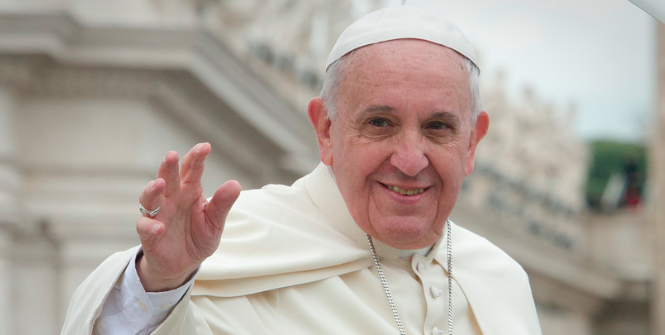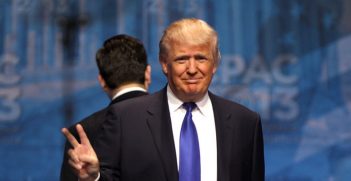Pope Francis: Shifting the Politics of Climate Change in the U.S.

As the 2016 U.S. Presidential Election rolls around, Pope Francis is planting seeds of change in the nation’s politically polarised climate change arena.
Much has been made of Pope Francis’s encyclical on climate change, which was delivered a few weeks ago to mixed receptions. In light of the upcoming 2016 U.S. Presidential Election, it is worth considering the encyclical’s implications for America’s longstanding partisan divide over climate change. The environment has been a subsidiary issue in past Presidential elections; even Obama, a well-known advocate for the environment, hardly acknowledged the issue during his 2012 campaign. But could the weight of the Pope’s word be a game changer this time around? Given the Papal Encyclical’s place as one of the Church’s most authoritative teaching documents to the 1.2 billion Catholics worldwide, the question certainly warrants deliberation.
Obama and other G-7 leaders recently pledged to cut greenhouse gas emissions from 40 to 70 percent by 2050, but deep scepticism among Republicans continues to undermine this commitment. Numerous states and all but one of the 20 Republican Presidential candidates oppose efforts to cut emissions, including current resistance to regulating existing power plant emissions. Many conservative politicians blatantly reject the notion that human activity contributes to global warming, a position reflected in the electorate. A recent Pew Research Center study shows that 43 percent of Republican voters believe there is “no solid evidence” of global warming.
By calling on rich nations to pay their social debts for the destruction of the environment, the Pope’s encyclical presents an opportunity to counter this Republican opposition. While the Pope’s rhetoric is not exactly revolutionary in the environmental space, there is huge significance for American policymakers in the way he pitches his points as a moral call for action by enshrining them in a religious context. The Pope’s belief that protecting creation is foremost a religious and moral issue links moral obligation with political decision-making and calls on politicians to respond personally, not just politically. The religious implications of this call to action place Republican Presidential candidates in an uncomfortable position. Conservative politicians frequently cite their religious convictions as informing their political beliefs, and religious credentials are key to political success. While it may be easy for Republicans to brush off so-called tree-hugging lefties, it will be much harder to dismiss one of the world’s supreme moral leaders.
Still, the Republican Presidential candidates’ responses to the encyclical have been primarily negative. Most candidates argue that the Church should stay out of what they see as a purely scientific debate. Presidential candidate and Catholic Jeb Bush countered the Pope’s message by claiming, “religion ought to be about making us better as people and less about things that end up getting in the political realm.” Additionally, fellow Catholic candidate Rick Santorum said last month that Americans were “better off leaving science to the scientists and focusing on what we’re really good at which is theology and morality.” Moreover, a third Catholic candidate Marco Rubio suggests the Pope’s word is not significant, considering the impact environmental action could have on America’s economy. However, these various remarks are inherently hypocritical. Jeb Bush has spoken of faith playing a role in shaping his policy, and Santorum has stated that his faith informs his opposition to same-sex marriage and abortion. Additionally, Rubio has continuously highlighted his Catholic roots on the campaign trail. Hence, by authoritatively elevating the protection of the environment to a moral level, the Pope has made it harder for these conservative candidates to justify why climate change should be a purely scientific debate, when they frequently invoke moral arguments as part of their policies.
Nonetheless, these climate sceptics won’t give in easily, and are unlikely to alter their policies drastically in the immediate future. But, crucially, this tension between Republican scepticism and Pope Francis’s stance provides hope for cracking the gridlock on climate change as the election approaches. The Pope’s call to action makes climate change a pivotal point of debate and threatens to turn it into a real political liability for Republican candidates as their campaigns escalate. While it is a slow process, the numbers suggest future progress. Public opinion surveys reveal that around two-thirds of Americans are more likely to vote for candidates on climate change action, including nearly half of Republican voters. Further, research shows this is especially true of Latinos and African-Americans – groups that make up a big proportion of the U.S. electorate – and of the Catholic population. There are almost 70 million Catholics in the U.S., making them the country’s largest religious domination at roughly 20 percent of the population. And although Catholic views are divided on climate change, a June study shows the percentage of Catholic Democrats who believe climate change is a serious problem has increased from 44 to 64 percent since the Pope assumed the papacy in early 2013. The number of Catholic Republicans overall has also grown, increasing from 14 to 24 percent in the last two years. This chunk of voters is too huge for Republication candidates to ignore in their strategic campaigning.
Meanwhile, other efforts continue to drive climate change to the forefront of Republican policy. Republican businessman Jay Faison recently launched a $175 million advocacy effort to reform the GOP’s views on the environment. Further, Senator Lindsey Graham is the sole Republican Presidential candidate pushing his party for an environmental policy. As the debate around climate change accelerates, conservative Presidential candidates will be forced to defend their beliefs from both a scientific and moral standpoint. Marco Rubio has already been forced to reverse statements denying global warming. When asked about the encyclical, Rubio even consented that it is his job to act in the common good, and that “it’s in the common good to protect our environment.”
For years, climate change has been a marginal issue in U.S. Presidential campaigns. But by making environmental protection a core tenet of church doctrine, Pope Francis has planted the seeds of a bigger climate change revolution heading into the 2016 election. Casting the war against global warming as a moral and religious obligation might just make Francis the unlikely hero that the environment so desperately needs.
Michelle Parker is an intern at the National Office of the AIIA. She has a Bachelor of International and Global Studies (Honours Class I) in American Studies from the University of Sydney. This article can be republished with attribution under a Creative Commons Licence.





